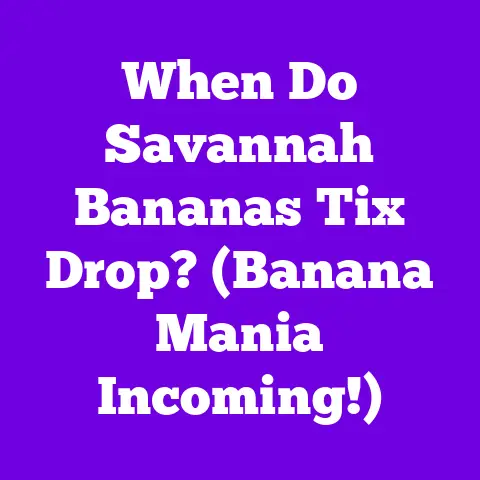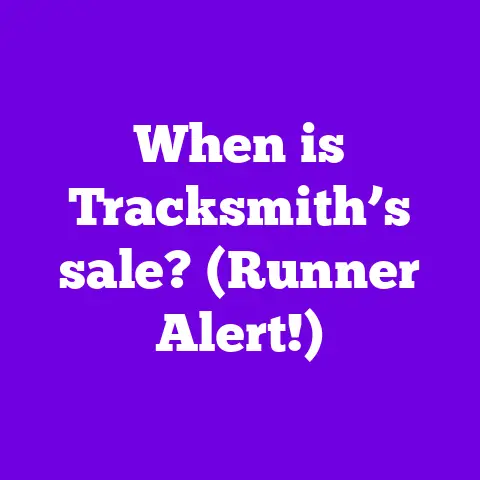Best Time for Garage sale? (Don’t Miss Peak Bargain Hunters!)
As we step further into an increasingly digital age, the landscape of buying and selling has transformed dramatically.
Online marketplaces and e-commerce giants have revolutionized how we acquire goods, yet one timeless tradition continues to thrive: the garage sale.
While social media and online platforms have made it easier to sell second-hand items, the charm and community spirit of a garage sale remain irreplaceable.
It’s a unique blend of local interaction, the thrill of discovery, and an eco-friendly approach to consumerism that keeps both sellers and shoppers returning to their driveways for more.
I remember my first garage sale like it was yesterday.
It was a crisp Saturday morning, and I was both excited and nervous.
As I set up my table, the aroma of fresh coffee wafted through the air, and soon enough, bargain hunters began to trickle in.
Each interaction became a delightful exchange, with stories shared over slightly used books and vintage trinkets.
I realized then that garage sales are not just about selling items; they’re about connecting with others in your community.
Statistics reveal that nearly 30% of Americans participate in garage sales every year, with millions of dollars changing hands as people hunt for hidden treasures.
The excitement of finding a unique item at a fraction of its retail price is an experience that online shopping simply cannot replicate.
However, the success of a garage sale is often dictated by timing.
When should you host your sale to attract the most shoppers?
Let’s explore this question and uncover the best times to host a garage sale to ensure you don’t miss out on peak bargain hunters.
Section 1: Understanding the Garage Sale Phenomenon
Garage sales have deep roots in American culture, serving as a microcosm of community engagement and consumer behavior.
They offer a space where neighbors can come together, share stories, and exchange goods.
In many neighborhoods, garage sales are an anticipated event, often celebrated and promoted through word-of-mouth and local community boards.
Decluttering is one of the primary reasons people host garage sales.
A recent survey showed that about 60% of individuals reported that they participated in garage sales primarily to clear out unnecessary items from their homes.
In our consumer-driven society, the act of decluttering has become intertwined with the quest for sustainability.
People are increasingly conscious of their environmental footprint, and garage sales provide an opportunity to give items a second life, reducing waste and promoting recycling.
Sociologist Dr. Mia Johnson emphasizes the social aspect beautifully: “Garage sales foster a sense of community; they create a space for interaction and connection.
It’s a way for individuals to engage with their neighbors and strengthen community ties.” This perspective highlights the importance of relationships in our increasingly digital world.
Moreover, the rise of online marketplaces has not diminished the allure of garage sales; instead, it has encouraged adaptability.
Many sellers now advertise their garage sales on platforms like Facebook and Nextdoor, reaching a broader audience.
This hybrid approach combines the charm of in-person sales with the convenience of technology, allowing sellers to maximize their reach and sales potential.
As we navigate the evolving landscape of consumerism, understanding the cultural significance of garage sales helps us appreciate their enduring value.
They are more than just a way to sell unwanted items; they embody a spirit of community, sustainability, and the thrill of discovery.
Spring and Early Summer: The Peak Season
Statistically, spring is the most popular time for garage sales, particularly from March through June.
This period coincides with “spring cleaning,” a tradition where homeowners declutter and refresh their living spaces.
The days are longer, and the weather is generally more favorable, making it an ideal time for outdoor sales.
I’ve noticed that the first warm weekend of spring often sees a surge in garage sales, as families emerge from winter hibernation eager to shed excess clutter.
Regional Variations
However, it’s essential to consider regional variations.
In warmer climates, garage sales can happen year-round, while in colder areas, the window may be limited to those few beautiful months.
For instance, in areas like Florida or Southern California, garage sales can be popular in the fall and winter months as well.
Key Holidays and Events
Certain holidays also significantly influence garage sale activity.
For example, Memorial Day and Labor Day weekends are popular times for neighborhood garage sales, as families often have extended time off and are more inclined to browse.
Local community events, such as fairs or festivals, can also attract potential shoppers, making it wise to schedule your sale around these happenings.
Community Calendars
Keep an eye on local community calendars to identify when residents are most likely to shop.
Some neighborhoods organize community garage sales, which can draw significant foot traffic.
Participating in these events not only enhances visibility but also fosters community spirit.
To illustrate peak months and trends, consider the following chart:
This chart demonstrates that spring and early summer consistently rank as the best times for garage sales, particularly in temperate regions.
Understanding these seasonal trends can significantly impact your decision-making process.
Section 3: Timing Strategies for Success
Beyond seasonal trends, specific timing strategies can enhance the success of your garage sale.
Best Times of Day
Research suggests that early morning is the prime time for garage sales.
Many avid bargain hunters are out and about by 7 a.m., eager to snag the best deals before the competition arrives.
I recall setting up my sale at dawn, and within the hour, my driveway was bustling with shoppers.
As the day progresses, foot traffic tends to decline, so if you want to maximize your sales, aim to start early.
Weekends vs. Weekdays
When considering the best days to host your sale, weekends are almost always the winning choice.
Most people have flexible schedules on Saturdays and Sundays, making it easier for them to browse.
While some may argue that less competition exists on weekdays, the reality is that fewer shoppers are available to attend.
Leverage Local Events
Another effective strategy is to capitalize on local events that draw crowds.
For instance, if your town is hosting a street fair or farmer’s market, setting your garage sale on the same day can increase foot traffic significantly.
I’ve seen garage sales thrive simply by aligning with larger events, turning a quiet day into a bustling marketplace.
Real-Life Examples
To illustrate, consider the story of my neighbor, Lisa, who hosted a garage sale during the annual neighborhood block party.
She strategically set up her sale in her front yard, benefiting from the influx of people attending the party.
By the end of the day, she had sold nearly everything, proving that optimal timing can lead to remarkable success.
Section 4: Preparing for the Future of Garage Sales
As we look to the future, it’s crucial to consider how technology and shifting consumer behaviors will impact garage sales.
The Role of Technology
Technology is increasingly becoming an integral part of the garage sale experience.
Social media platforms like Facebook and Instagram allow sellers to promote their sales to a broader audience.
I often see local groups dedicated to garage sales where individuals can post photos of items and details about upcoming sales.
This engagement not only boosts visibility but also creates anticipation among potential shoppers.
Hybrid Garage Sales
The rise of hybrid garage sales is another exciting development.
These sales incorporate online elements, enabling sellers to list items on platforms like Facebook Marketplace while also hosting in-person events.
This approach enhances reach and allows sellers to cater to both online and offline shoppers.
Post-Pandemic Shifts
The COVID-19 pandemic has altered consumer behavior, with many people becoming more selective about where and how they shop.
As we emerge from the pandemic, some shoppers may still prefer in-person experiences, while others may continue to lean toward online shopping.
Understanding this dynamic can help you effectively market your garage sale, appealing to both demographics.
Engaging Younger Generations
To keep the spirit of garage sales alive, it’s essential to engage younger generations who may be more inclined to shop online.
By showcasing unique and trendy items on social media, you can attract a younger audience who appreciates the thrill of finding a bargain.
Conclusion
In summary, timing is a critical factor in the success of a garage sale.
From understanding seasonal trends to implementing strategic timing strategies, being mindful of when you host your sale can make all the difference.
Garage sales embody a spirit of community, sustainability, and the joy of discovery, making them a cherished tradition in an ever-evolving marketplace.
As you consider hosting your own garage sale, I encourage you to embrace the excitement and connection that comes with it.
Remember to plan for optimal timing, engage with your community, and leverage technology to maximize your reach.
The thrill of bargain hunting and the satisfaction of connecting with your neighbors await you.
Looking ahead, garage sales will continue to flourish as a beloved tradition, adapting to the needs of future generations.
So gather your items, mark your calendar, and get ready to welcome the next wave of bargain hunters into your driveway.
Happy selling!






